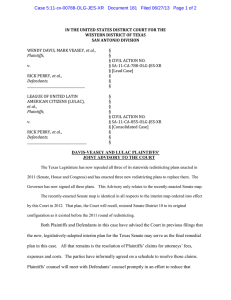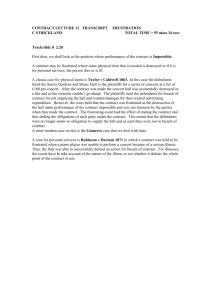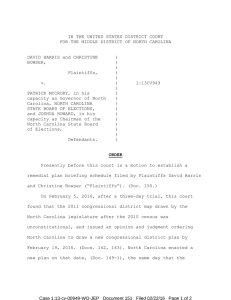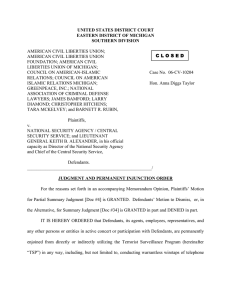IN THE UNITED STATES DISTRICT COURT EASTERN DISTRICT OF KENTUCKY
advertisement
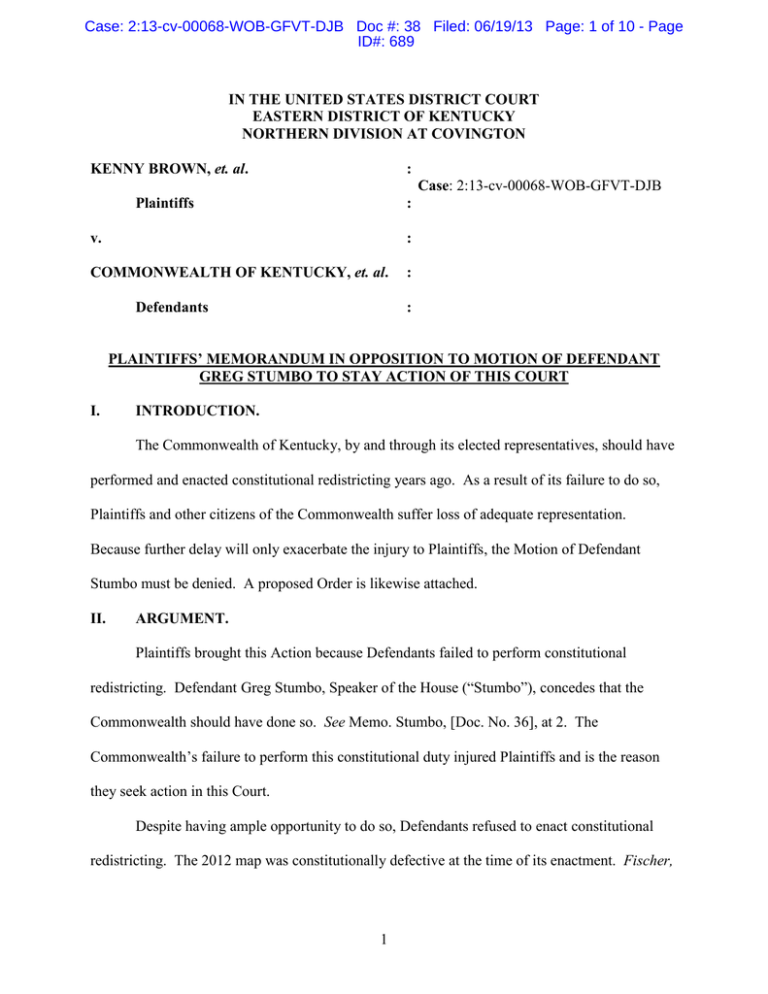
Case: 2:13-cv-00068-WOB-GFVT-DJB Doc #: 38 Filed: 06/19/13 Page: 1 of 10 - Page ID#: 689 IN THE UNITED STATES DISTRICT COURT EASTERN DISTRICT OF KENTUCKY NORTHERN DIVISION AT COVINGTON KENNY BROWN, et. al. : Case: 2:13-cv-00068-WOB-GFVT-DJB Plaintiffs : v. : COMMONWEALTH OF KENTUCKY, et. al. : Defendants : PLAINTIFFS’ MEMORANDUM IN OPPOSITION TO MOTION OF DEFENDANT GREG STUMBO TO STAY ACTION OF THIS COURT I. INTRODUCTION. The Commonwealth of Kentucky, by and through its elected representatives, should have performed and enacted constitutional redistricting years ago. As a result of its failure to do so, Plaintiffs and other citizens of the Commonwealth suffer loss of adequate representation. Because further delay will only exacerbate the injury to Plaintiffs, the Motion of Defendant Stumbo must be denied. A proposed Order is likewise attached. II. ARGUMENT. Plaintiffs brought this Action because Defendants failed to perform constitutional redistricting. Defendant Greg Stumbo, Speaker of the House (“Stumbo”), concedes that the Commonwealth should have done so. See Memo. Stumbo, [Doc. No. 36], at 2. The Commonwealth’s failure to perform this constitutional duty injured Plaintiffs and is the reason they seek action in this Court. Despite having ample opportunity to do so, Defendants refused to enact constitutional redistricting. The 2012 map was constitutionally defective at the time of its enactment. Fischer, 1 Case: 2:13-cv-00068-WOB-GFVT-DJB Doc #: 38 Filed: 06/19/13 Page: 2 of 10 - Page ID#: 690 et. al. v. KY LRC, Franklin Circuit Court No. 12-CI-109; LRC v. Fischer, 366 S.W.3d 905 (Ky. 2012). This was a point so well known to members of the General Assembly that members of that very body brought suit immediately after its passage to have it set aside. Id. As a result of that suit, the 2012 map was in fact declared unconstitutional. Id. The Commonwealth then conducted the 2012 elections with unconstitutional, mal-apportioned districts. In fact, the point was so well known that, at the time, the Senate President, David Williams, had a non-severability clause inserted into the bill at the 11th hour, so that when the House map, which was the most egregious, was struck down, the Senate map would likewise be struck down. See 2012 H.B.1,1 and S.C.S. 1.2 After the Kentucky Supreme Court declared the 2012 maps unconstitutional, the Kentucky Senate and Kentucky House went into the 2013 legislative session without pre-filing any re-districting bills. These parties then went through the 2013 session without taking up redistricting until the eleventh hour. Even worse was the action of the House of Representatives to stymie the process by changing the population basis at the very end of the 2013 legislative session. See 2013 H.B.2 3 There is no evidence at this juncture that the Kentucky Senate and Kentucky House of Representatives will agree on any maps, much less maps that comply with the Constitution. On the other hand, that Defendants have violated the Constitutional mandate for redistricting in 2012 and again in 2013 demonstrates the need for this Court require them to act—and that they do so without additional delay. Further delay is very likely to result in the redistricting to occur after November 4, 2013—or too near that date to allow hopeful candidates to meet the residency 1 Available at http://www.lrc.ky.gov/record/12RS/HB1.htm (last visited 6/19/2013) Committee Substitute adopted January 18, 2012, available at: http://www.lrc.ky.gov/record/12RS/HB1/SCS1.doc (last visited 6/19/2013) 3 Available at: http://www.lrc.ky.gov/record/13RS/HB2.htm (last visited 6/19/2013) 2 2 Case: 2:13-cv-00068-WOB-GFVT-DJB Doc #: 38 Filed: 06/19/13 Page: 3 of 10 - Page ID#: 691 requirements of the Kentucky Constitution. For example, the President of the Senate has raised as a point of contention between the Kentucky House and Senate the use of federal prisoner populations in the maps.4 See Answer and Counter/Cross-Claims of Kentucky Senate President Robert Stivers, [Doc. No. 32]. Stumbo erroneously claims that Plaintiffs ask this Court to impose maps by judicial fiat. See Memo. Stumbo, [Doc. No. 36], at 2. Not so. Ignoring the fact that the use of “fiat” is both insulting to this Court and inaccurate,5 Plaintiffs resorted to this Court only because Defendants refuse to perform their Constitutional duties. There is ample precedent from the United States Supreme Court to guide this Court in remedying Defendants constitutional violations for the November 4, 2013 residency deadlines and the 2014 election cycle. Colleton County Council v. McConnell, 201 F. Supp. 2d 618 (D. S.C. 2002) (setting forth various guideposts to govern judicially drawn districts). Stumbo irrelevantly argues that Plaintiffs are not currently candidates for office. See Memo. Stumbo, [Doc. No. 36], at 2. What Stumbo ignores is that, under Kentucky law, Plaintiffs cannot file for office yet. Pursuant K.R.S. 118.125, November 6, 2013 is the earliest 4 Although Plaintiffs’ position on the inclusion of prisoner populations is not necessary for opposing Defendant Stumbo’s motion to stay proceedings of this Court, Plaintiffs are indifferent as to whether the prison populations are included or excluded. Plaintiffs do believe that the question is a political one for the Kentucky House and Senate to resolve. However, this question cannot trump Plaintiffs’ right to having constitutional districts drawn and maps enacted. That requires, among other things, that the same population basis be used to apportion Congressional House districts, State House districts, and State Senate districts, on equal protection grounds. Furthermore, the exclusions of population groups, while constitutional and permissible, cannot treat similarly situated groups differently. Carrington v. Rash, 380 U.S. 89, 85 S. Ct. 775; 13 L. Ed. 2d 675 (1965) (impermissible to treat prisoners differently than other similarly situated groups, such as students and military who were not residents of the state). must at least pass a rational basis test – meaning that, if federal prisoners are excluded, the State Senate and State House should be prepared to explain and articulate a rational basis, other than trying to gerrymander districts, as to why they did not exclude out of state students, or military members stationed in Kentucky whose home of record is outside the state. In any event, it appears that Kentucky leaders understand these issues and have already agreed to use consistent districts to avoid these very issues. See http://nky.cincinnati.com/viewart/AB/20130617/NEWS0103/306170156/Beshear-Districts-may-redone (last visited 06/18/13). 5 See Black’s Law Dictionary 638 (7th ed. 1999) defines “fiat” as “1. An order or decree, esp. an arbitrary one. . . . 2. A court decree, esp. one relating to a routine matter . . . .” Emphasis added. This Court’s intervention is not arbitrary, nor is the matter involved routine. 3 Case: 2:13-cv-00068-WOB-GFVT-DJB Doc #: 38 Filed: 06/19/13 Page: 4 of 10 - Page ID#: 692 date candidates can file for office in 2014 election cycle. Indeed, this goes to the heart of the problem: Plaintiffs cannot file for office without knowing which district they will be residing in. Nor is there any way they can be sure of meeting the Constitutional residency requirement if redistricting does not occur prior to November 4, 2013. Worse yet, they will they no opportunity to move in order to satisfy the residency requirement for the district that they desire to serve. All of this represents serious and significant harm. Moreover, Plaintiff Brown must react, potentially at the last possible minute, to facilitate newly drawn districts in one of the largest and fastest growing counties of the Commonwealth. The plain fact is, the delay sought favors incumbents, while constitutionally injuring of Plaintiffs and other citizens similarly situated. Finally, Plaintiffs run the very real risk of unconstitutional districts being drawn again, thus forcing a “fire drill” scenario for this Court to attempt to draw constitutional maps in a relatively short time frame. Indeed, as precedent demonstrates, that appears to be Defendants modus operandi. See, H.B. 1, 2012 Session; H.B. 2, 2013 Session; LRC v. Fischer, 366 S.W.3d 905 (Ky. 2012). Likewise erroneous is Stumbo’s claim that if the Kentucky General Assembly completes redistricting prior to November 4, 2013, the “alleged harm claimed by Plaintiffs will not be incurred and the Complaint will be rendered moot.” See Memo. Stumbo, [Doc. No. 36], at 2-3. But that proves too much because it is remains true that mootness will not occur unless and until constitutional districts are in fact redrawn. Given the Defendants’ track record, that cannot be presumed—especially given the fact that there remains only four months for redistricting to occur. More importantly, Stumbo’s argument also fails because Plaintiffs seek prospective injunctive relief. This relief is required as a result of the constitutional violations Plaintiffs have already suffered—and continue to suffer—because of the actions of Defendants. 4 Case: 2:13-cv-00068-WOB-GFVT-DJB Doc #: 38 Filed: 06/19/13 Page: 5 of 10 - Page ID#: 693 Contrary to Stumbo mistaken assertion, Johnson v. Miller, 864 F. Supp. 1354 (S.D. Ga. 1994) does not require this Court stay the proceedings to allow the legislature to continue its constitutional violations into its next session. In the Johnson case, the court imposed judicially drawn districts upon the state of Georgia. And nothing in Growe v. Emison, 507 U.S. 25, 33 (1993), compel the issuance of a stay. To the contrary, the Growe case plainly states that “[a]bsent evidence that these state branches will fail timely to perform that duty [of constitutional reapportionment], a federal court must neither affirmatively obstruct state reapportionment nor permit federal litigation to be used to impede it.” Id. at 34 (emphasis added). Instead of impeding the redistricting process, Plaintiffs are asking this Court to require that it be done. The holdings in both Johnson and Growe support Plaintiffs position. Plaintiffs are asking this Court merely to see that Defendants do conduct constitutional state reapportionment; Plaintiffs are not seeking to have this Court impede that process—but to speed it up. Although Stumbo seeks abstention by this Court, he has presented no valid ground for this Court to decline the case. In particular, Stumbo’s reliance on Younger v. Harris, 401 U.S. 37 (1971) is misplaced. First, the principles of abstention raised in Harris apply to pending state court actions, not possible legislative consideration that might occur in the future. On the other hand, there is abundant precedent where federal courts have imposed constitutional maps on states where the states failed to perform their constitutional duty. See, e.g. Johnson v. Miller, 864 F. Supp. 1354 (S.D. Ga. 1994); Colleton County Council v. McConnell, 201 F. Supp. 2d 618 (D. S.C. 2002). Further undermining Stumbo’s erroneous contention is the fact that there is no legislative session dates currently set. There is nothing more than press reports that the Governor says he is inclined to call such a session. Even assuming the press reports are true and a session 5 Case: 2:13-cv-00068-WOB-GFVT-DJB Doc #: 38 Filed: 06/19/13 Page: 6 of 10 - Page ID#: 694 is called, there is absolutely no evidence that any maps will come out of such a session—much less constitutional maps. All that is clear at present is that there is exists substantial controversy and disagreements between the Kentucky House and Senate. See Answer and Counter/CrossClaims of Kentucky Senate President Robert Stivers, [Doc. No. 32]. In light of the Defendants’ track record, this makes the likelihood of any constitutional map being passed unlikely at best. In Cox v. Larios, 542 U.S. 947 (2004), the United States Supreme Court affirmed a district court’s striking of maps adopted in Georgia. In that case, the District Court found that legislative districts were drawn in a punitive manner to harm incumbent Republicans by the Democratic majority, pitting incumbent legislator against incumbent legislator, as opposed to conducting such redistricting in a constitutional manner. Larios v. Cox, 300 F. Supp. 2d 1320, 1329 (N.D.Ga. 2004) (“While Democratic incumbents who supported the plans were generally protected, Republican incumbents were regularly pitted against one another in an obviously purposeful attempt to unseat as many of them as possible.”). These practices led to the district court striking the Georgia maps. Following the outcome in Cox, the specter of the maps bring proposed by Defendants in this case being set aside is great. The Kentucky House has drawn maps pitting incumbent Republicans against each other, and various other punitive measures towards Republicans, that appears to be almost directly on point with what occurred in Georgia. Because Defendants’ constitutional violations—and their failure to correct constitutional violations following findings of Kentucky’s courts—Plaintiffs ask this Court to: (1) set a deadline for Defendants to complete redistricting that complies with the Constitutions of Kentucky and United States not later than August 5 2013; (2) require the parties to submit stipulations as to population and census maps sufficient for this Court to take action in an expedient manner in the event that Defendants fail to enact constitutional redistricting in session 6 Case: 2:13-cv-00068-WOB-GFVT-DJB Doc #: 38 Filed: 06/19/13 Page: 7 of 10 - Page ID#: 695 (allowing sufficient time for the Court to adjudicate and act if it should be necessary due to Defendants failure to redistrict in a constitutional manner); (3) require discovery to proceed in the meantime (and provide for expeditious means to resolve any discovery disputes); and (4) enter a scheduling order to expedite resolution of this case by November 4, 2013 in either event. Plaintiffs would actually prefer for Defendants to perform their duty by, at long last, properly enacting constitutional maps. However, for the August 5, 2013 deadline to be acceptable to Plaintiffs, Plaintiffs propose that this Court also include a deadline for the filing of any Amended Complaints by August 19, 2013, or within 14 days of the enactment of any revised legislative districting plan, especially if revised maps are enacted and challenged. Plaintiffs also suggest 30 days for discovery, through September 19, 2013; deadlines for Motions should be approximately one week later, i.e., September 26, 2013, and responses one week thereafter, on October 3, 2013, with replies by October 8, 2013, and any evidentiary hearings or hearings to take argument to be held in the second and third weeks of October. If this accelerated scheduled is not acceptable to the Court and the parties, then Plaintiffs ask the deadlines occur sooner mindful of the November 4, 2013 residency deadlines. Part of the fundamental problem with staying this matter is apparent from the pleadings filed to date by the Defendants. For instance, the population data attached to Plaintiffs’ Complaint, which came from the Kentucky Legislative Research Commission, should not be controversial or subject to dispute. But the Defendants in this case have denied the accuracy of the census data. The constant quibbling by Defendants over even items objectively established demonstrate that more time, not less, will likely be necessary to litigate the issues. Staying the matter will not aid in resolving this case; rather, it merely affords Defendants opportunity to continue their gamesmanship back in Frankfort. In short, because of Defendants past violations, 7 Case: 2:13-cv-00068-WOB-GFVT-DJB Doc #: 38 Filed: 06/19/13 Page: 8 of 10 - Page ID#: 696 there is simply no time wait and see whether Defendants will pass constitutional maps on their opportunity to do so. November 4, 2013—and even January 2014—are too close. The approach advocated by Plaintiffs is to denying the stay, but allow Defendants an opportunity to remedy the issue, while also ensuring that a meaningful factual record can be developed, and ensuring that constitutional maps are enacted in a timely manner. Plaintiffs’ approach is consistent with case law. Favors v. Cuomo, 881 F. Supp. 2d 356 (E.D.N.Y. 2012) (“the public interest would not be served by a chaotic, last-minute reordering of Senate districts. It is best for candidates and voters to know significantly in advance of the petition period who may run where.”) The Favors Court likewise found significant that the “primary election process begins in less than four weeks with the opening of the period for candidates to solicit nominating petitions.” Id. at 371. The primary season for the 2014 elections begins November 6, 2013. The residency deadline is November 4, 2013. As of the date of this Memorandum, that date is approximately four months away. Defendant Stumbo’s approach, of staying this matter, if Defendants are unsuccessful in enacting constitutional maps, or fail to enact any maps, would essentially create the difficulties noted in Favors in attempting to enact maps in a last minute fashion. The Favors Court noted the inherent difficulty in responding to a measure within four weeks: “[i]n order to grant relief in time to guide (and not disrupt) that process, the Court would need to decide the complex legal issues governing discovery and the scope of the issues to be resolved at the hearing, allow the parties time to conduct whatever discovery is allowed, conduct the hearing, resolve the difficult legal and factual issues to establish whether the movants are likely to prevail, and then, if the movants succeed in establishing entitlement to relief, craft what 8 Case: 2:13-cv-00068-WOB-GFVT-DJB Doc #: 38 Filed: 06/19/13 Page: 9 of 10 - Page ID#: 697 at least some intervenors argue should be an entirely new plan for the redistricting of the state Senate, all within a few weeks.” 881 F. Supp. 2d 356. Finally, in addition to contesting the remedial measures, Defendants also appear to contest the issue of liability. Therefore, Plaintiffs further request this Court establish a briefing schedule for dispositive motions to address the issue of liability concerning the current malapportionment of the district, preferably on stipulations and cross-motions for Summary Judgment, in early August, 2013. Plaintiffs ask that any schedule entered by this Court provide for resolution of the question of liability by the August 5, 2013 deadline. III. CONCLUSION. For the foregoing reasons, Defendant Stumbo’s Motion for Stay should be denied. Plaintiffs also ask this Court to enter a schedule that permits timely resolution of this matter as provided for in the attached proposed order. 9 Case: 2:13-cv-00068-WOB-GFVT-DJB Doc #: 38 Filed: 06/19/13 Page: 10 of 10 - Page ID#: 698 Respectfully submitted, /s/ Christopher Wiest___________ Christopher Wiest (KBA 90725) Chris Wiest, Atty at Law, PLLC 25 Town Center Blvd, Suite 104 Crestview Hills, KY 41017 859/486-6850 (v) 513/257-1895 (c) 859/495-0803 (f) chriswiestlaw@yahoo.com Rick Brueggemann (90619) E. Jason Atkins (88044) Hemmer DeFrank, PLLC 250 Grandview Dr. Fort Mitchell, KY 41017 859/578-3855 (v) 859/578-3869 (f) rbrueggemann@hemmerlaw.com Attorneys for Plaintiffs CERTIFICATE OF SERVICE I certify that a copy of the foregoing has been served via the Court’s CM/ECF system to all parties, or their counsel, this 19th day of June, 2013. /s/ Christopher Wiest___________ Christopher Wiest (KBA 90725) 10

